Israel Advocacy Groups
What are the different American Jewish organizations that focus on Israel?
Part of: Hey Alma’s Guide to the Israeli-Palestinian ConflictIt’s no secret that American Jews have feelings on Israel. The nature of those feelings is not by any means cohesive — which is why numerous special interest groups exist! So what’s the difference between J Street and AIPAC? What does IfNotNow advocate for?
Let’s get into it.
For ease of understanding, we’ve sorted these five groups in order of where they fall on the political spectrum, from right to left:
ZOA
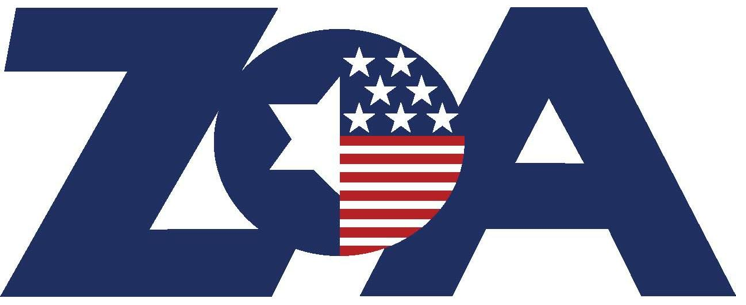
The Zionist Organization of America (ZOA) is the furthest right-wing group on this list. Founded in 1897, its website proclaims that it is the “oldest pro-Israel organization in the United States.” The second line of its mission? It’s dedicated to “educating the public, elected officials, media, and college/high school students about the truth of the ongoing and relentless Arab/Islamic war against Israel.”
The ZOA opposes Palestinian statehood, rejects the two-state solution, supports Israeli settlements, opposed the Israeli withdrawal from Gaza in 2005, and is generally supportive of President Donald Trump’s policies on the Middle East. ZOA’s op-eds have been published in Breitbart, it honored Steve Bannon at a dinner last year, and it advocated for the ban on travel from several Muslim countries.
The ZOA’s president, Mort Klein, is a name you should probably know — he’s at the forefront of the majority of ZOA’s activities and has been since 1994. He’s a big anti-BDS voice and is concerned about Jewish students on college campuses.
Anyhoo, if there’s one takeaway from ZOA, just think: right-wing pro-Israel.
AIPAC

AIPAC stands for the American Israel Public Affairs Committee. AIPAC is arguably the most influential pro-Israel lobbying group in America. Its mission, as its website reads, is “to strengthen, protect and promote the U.S.-Israel relationship in ways that enhance the security of the United States and Israel.”
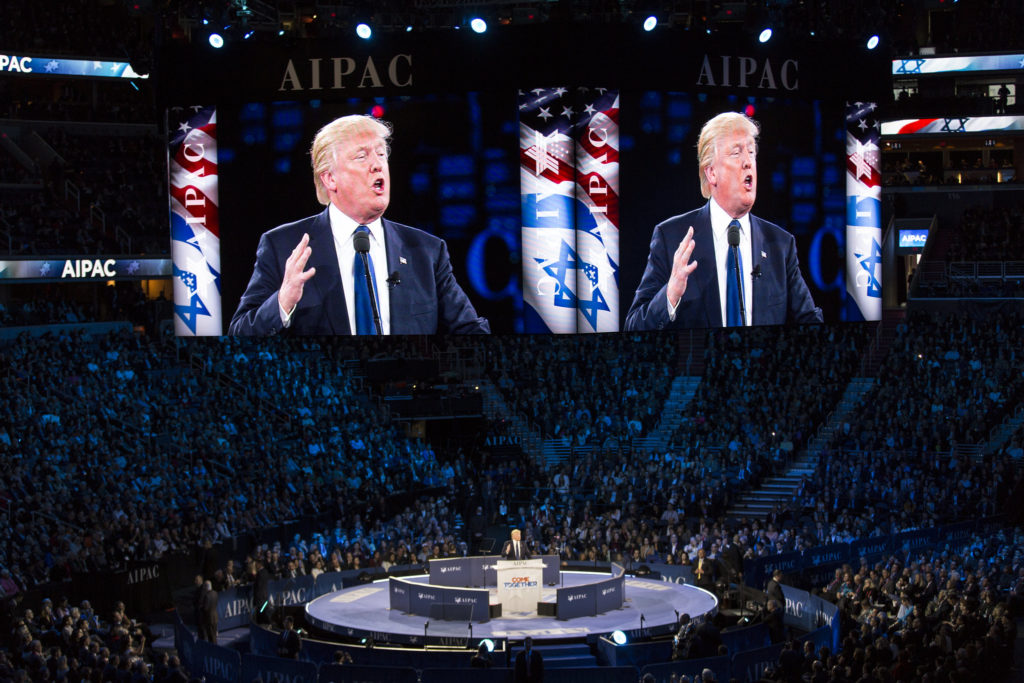
AIPAC, even though it has “PAC” in its acronym, is not a political action committee and does not give money directly to politicians or campaigns. Yet, it does signal to supporters which candidates are worthy of a donation. And it does lobby for specific pieces of pro-Israel legislation. AIPAC expects its activists to support candidates on both sides of the aisle; it “urge[s] all members of Congress to support Israel through foreign aid, government partnerships, joint anti-terrorism efforts and the promotion of a negotiated two-state solution — a Jewish state of Israel and a demilitarized Palestinian state.” AIPAC will usually support whatever the Israeli government’s position is.
Most members of Congress usually appear at AIPAC’s annual conference, as do major presidential candidates; as Ron Kampeas writes in JTA, “At AIPAC’s annual policy conference, a highlight has been the roll call: Top staff and lay leaders gather on stage and shout out the names of every lawmaker who has been in attendance. AIPAC mobilizes an army of supporters who are inclined to support pro-Israel candidates with their votes, time and money.” Here’s his super clear explainer on how the group operates.
J Street

J Street is much newer than AIPAC and ZOA — founded in 2008, the organization “organizes and mobilizes pro-Israel, pro-peace Americans who want Israel to be secure, democratic and the national home of the Jewish people.” Support for the peace process and a two-state solution is arguably the major plank of its mission.
It’s a liberal lobby — pro-Israel, but definitely not simply supporting Israel’s government just because it’s Israel’s government. At its 10th anniversary conference in April 2018, the group denounced Trump and Netanyahu as twin villains. “All across the globe liberal democracy is in retreat,” Jeremy Ben Ami, J Street’s president, said. “J Street proudly opposes these trends, and we couldn’t be clearer in the threat President Trump and Prime Minister Netanyahu pose.”
In sum: J Street is left wing, frequently criticizes the Israeli government, and wants the U.S. to pressure the Israelis and Palestinians into forging a two-state solution.
IfNotNow
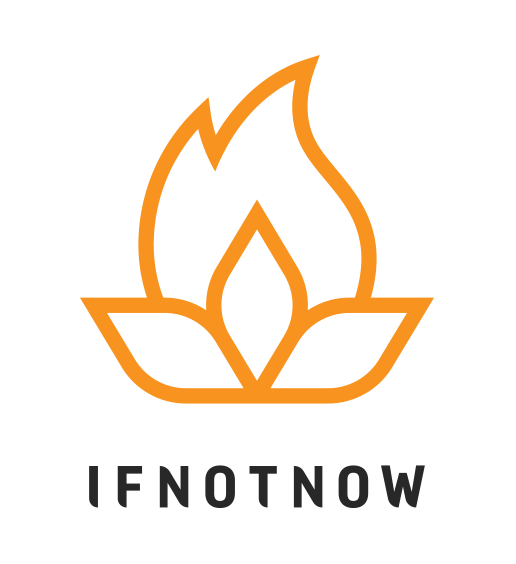
Founded in 2014 in the wake of the 2014 Israel-Gaza conflict, IfNotNow began to protest American Jewish institutional support for Israel’s actions. The name comes from the famous — well, Jewish-famous — Hillel quote, “If I am not for myself, who will be for me? If I am only for myself, what am I? If not now, when?”
IfNotNow is dedicated to ending Israel’s occupation, and unlike most other Jewish groups, refuses to stake out a position in support of Israel’s existence as a Jewish State. It defines the occupation as the Israeli military rule over Palestinians in the West Bank, Eastern Jerusalem, and Gaza. It states, “We will be the generation that ends our community’s support for the occupation. Will you join us?”
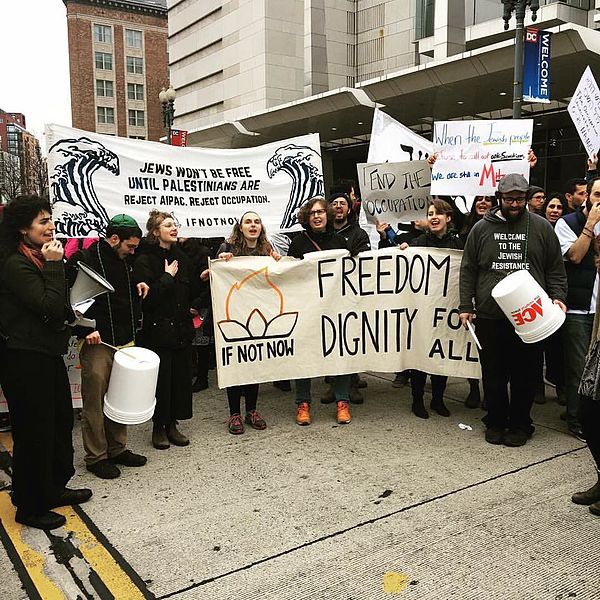
It’s more of an activist group than a lobbying group — members recite the Jewish prayer of mourning (the Mourner’s Kaddish) outside political offices, it stages protests and gatherings, and generally organizes Jews to action. It also has a campaign against Birthright right now. Compared to the first four groups above, IfNotNow is a lot younger and smaller.
Tl;dr: IfNotNow is an anti-occupation protest organization with no position on Jewish statehood.
JVP
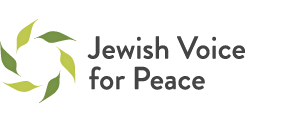
Jewish Voice for Peace (JVP) is a left-wing activist organization. Its mission statement reads: “Jewish Voice for Peace opposes anti-Jewish, anti-Muslim, and anti-Arab bigotry and oppression. JVP seeks an end to the Israeli occupation of the West Bank, Gaza Strip, and East Jerusalem; security and self-determination for Israelis and Palestinians; a just solution for Palestinian refugees based on principles established in international law; an end to violence against civilians; and peace and justice for all peoples of the Middle East.”
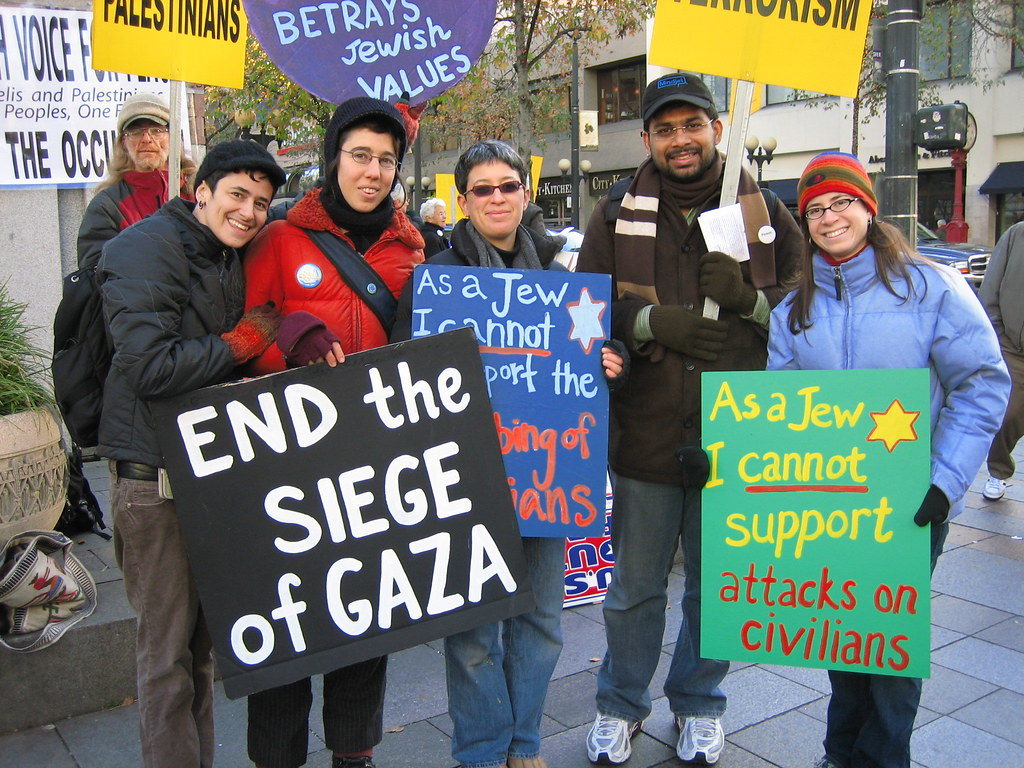
JVP does not endorse a two-state solution (or one-state solution); it supports the right of return for Palestinian refugees; it opposes the Jewish law of return; and it supports the BDS movement. It is an anti-Zionist organization. As its website states, “Jewish Voice for Peace is guided by a vision of justice, equality and freedom for all people. We unequivocally oppose Zionism because it is counter to those ideals.”
In sum: JVP is the most left wing and the only stridently anti-Zionist group on this list.
2014 Israel-Gaza conflict
Known to Israelis as Operation Protective Edge, this was a military campaign launched by Israel in 2014 in response to the kidnapping and murder of three Jewish teenagers by Hamas.
West Bank
The West Bank is the territory captured from Jordan by Israel in 1967. It remains the core piece of disputed territory between Israelis and Palestinians.
Gaza
The Gaza Strip is a coastal territory bordered by Israel, Egypt and the Mediterranean Sea. The strip was occupied by Israel following the 1967 war and returned to Palestinian control in 2005.